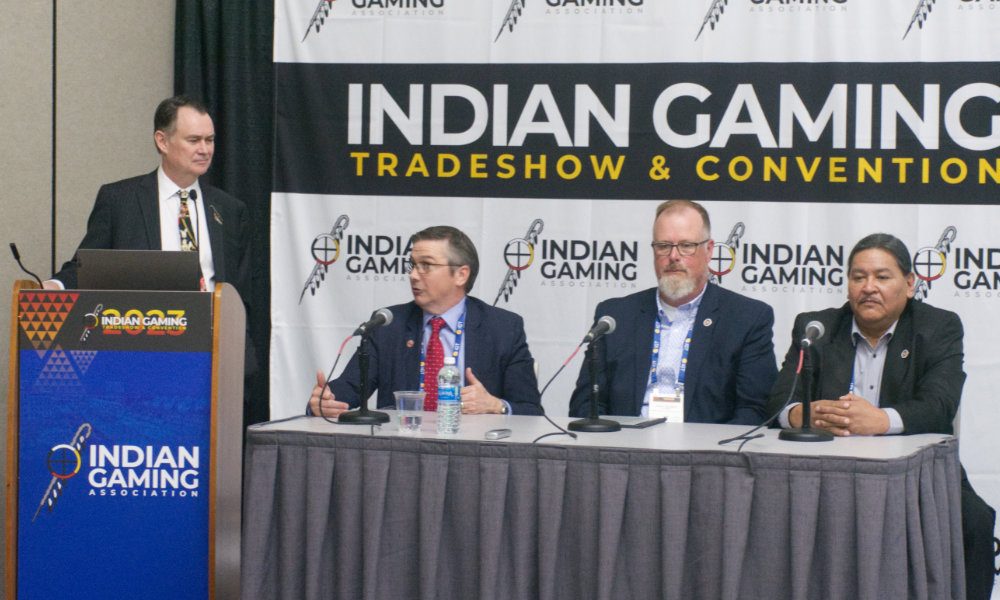The momentum for creating casino gaming in Texas has stalled for now, but a tribal leader and gaming lawyers said it’s inevitable that it will be enacted in the future.
That was the takeaway from a session at the Indian Gaming Tradeshow & Convention on the recent developments in the possible expansion of gaming in Texas.
In 2021, the Texas Legislature held its first preliminary hearing to weigh gaming and a new bill was up for discussion for the 2023 session. State officials have sent mixed messages about whether they will continue to oppose the efforts.
The Las Vegas Sands Corp. has spent millions of dollars to get gaming enacted in Texas, where religious leaders have long fought against casinos and any expansion of gambling.
“We’re all seeing what happens with the Texas Legislature, while watching to see what happens with IGRA (the federal Indian Gaming Regulatory Act), and the National Indian Gaming Commission,” said Brant Martin, a gaming attorney and partner with Wick, Phillips, Gould & Martin.
Martin said religious groups have held sway over the Texas Legislature his entire life, but one of the reasons the gaming bill got some momentum this term, even though “that momentum seems to have stopped entirely, at least for this session,” is that there’s “an aura of inevitability for it” even though the timeline isn’t known.
“This particular set of bills got more momentum early in the session than everyone thought it would, but it ran up against the wall of Lieutenant Governor (Dan) Patrick, who controls the ability to bring a bill in the Senate. If you can’t carry it in the Senate, it’s not going to happen. But the concept behind the inevitability of it seems to be the recurring theme.”
Rory Dilweg, a gaming attorney and partner with Ocotillo Law and Policy Partners, said the issue has traction due to all the money thrown at it from Sands Corp. and Texas billionaire and Las Vegas casino owner Tilman Fertitta. With casinos located across the border in Oklahoma and gambling in Texas at tribal casinos, it’s difficult to argue Texans aren’t gambling.
“A former legislator said it’s not going to pass this session and we asked why,” Martin said. “He said because there’s no budget deficit. They don’t have to pass it. They’ll pass it when they have to, but not before then.”
Martin argued a case before the U.S. Supreme Court, Ysleta del Sur v. State of Texas, in which the court last summer ruled that two Texas tribes have the sovereign right to engage in electronic bingo, capping a monumental 30-year legal battle. His client operates the Speaking Rock Entertainment Center near El Paso.
Martin said Supreme Court Justice Neil Gorsuch “dropped a footnote” in last year’s decision and left it ambiguous whether IGRA applies to the tribe’s case.
“It’s a question the Supreme Court left open, so the effect of that is definitely out there,” Martin said. “Being a resident of Texas for 52 years, I think the future of gaming is it’s coming, but when it comes and what the scope of it is I don’t know.”
The so-called Destination Resorts bill has gotten a lot of attention in Texas for two casinos in the Dallas Metroplex, two in Houston, one in San Antonio, and another undetermined option. Horse tracks are also involved.
“It won’t pass this session, but in my personal opinion, whenever it comes, it will be some iteration of that (Destination Resorts bill),” Martin said.
Dilweg, counsel for the Alabama-Coushatta Tribe of Texas that operates Naskila Gaming, said tribes are looking to expand their offerings and facilities, so they look more like destination resorts.
Ronnie Thomas, treasurer of the tribal gaming agency of the Alabama-Coushatta Tribe of Texas, concurred that gaming expansion is imminent, but it will be a “tough row to hoe” and that it’s important for tribes to participate. A horse-race track, Sam Houston Park, is located within 80 miles from their tribe’s facility north of Houston.
“The tribe’s participation in moving forward and getting our language incorporated in any of these legislative bills is paramount,” Thomas said. “It has to be done, because if we don’t participate, they’ll write that legislation for us and that’s one thing we cannot allow anyone to dictate.”
As for opposition, Thomas acknowledges that the “religious right” opposes gaming expansion, but the tribe has its beliefs as well.
“We’re a Native American tribe doing our thing,” Thomas said. “We have our own beliefs and religion. The arguments that these religious groups make about gaming problems and addiction and concerns about divorces and kids have validity behind them. That’s a person’s choice. They can argue all they want, but the tribes will continue to move forward with our Class II gaming activities.”


